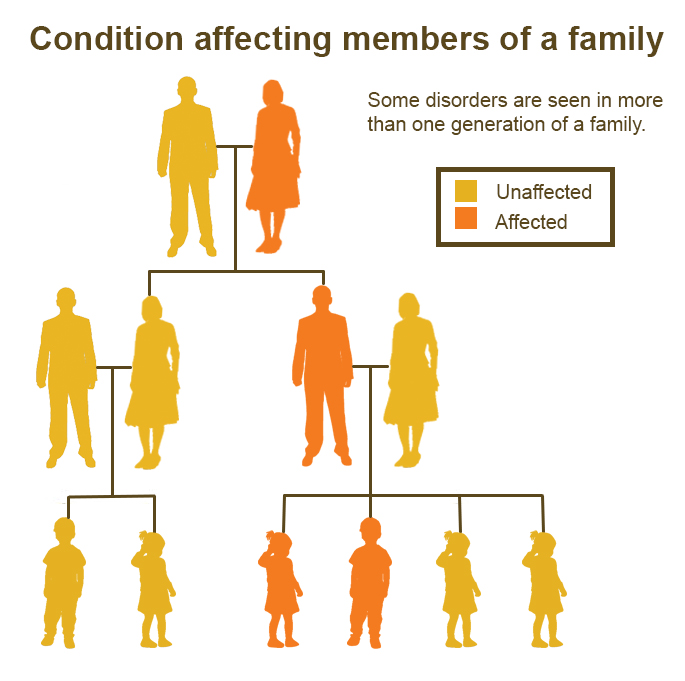Mental Health? What Does Our DNA Have To Do With It?
Jul 20, 2019
1508 Views
A Quick Look Through:
Mental health issues are the conditions that an individual in every possible way; how they think, how they feel and how they act. These illnesses can influence an individual’s life and sometimes go beyond any explanation. The human brain is one of the most complex organs in the history of biological sciences. Its growth depends on many factors including its relationship with the environment and genetic makeup. As we try to understand the intricacies of the brain, we should keep in mind that the genetic and non-genetic channels play a role in its development. Illnesses of the brain, despite their varied pathophysiology eventually affect the overall performance of the brain (Hyman SE, 2000). Majority of neurological disorders and factors causing them have now become obsolete. Why and how a particular event happened in our lives Thoughts like this are one of the major things that bother human beings, and make people ponder at after episodes of suicide attempts, and chronic psychotic illness. Scientific research revealed that most of the mental health disorders are a mixture of environmental, biological and genetic factors, and have discovered genes and genetic variations that are associated with mental health illnesses. So the question arises… What is the preferred way to look at our genes and assess our personal risk?
What Do Our Genes Tell?
Family History:
Our family history is a key indicator of the chances of developing mental health disorders among various other illnesses. Few diseases happen to have a long run in the families and with a relative of yours suffering from it, will only increase your chances of getting it. Also, if a member of your family is suffering from a mental health issue it doesn’t truly mean you will acquire the disease, but will surely help the physician evaluate your potential risk to and plan to reduce the side effects and the risk factors.

(Source: https://www.healthychildren;.org/English/health-issues/conditions/emotional-problems/Pages/Inheriting-Mental-Disorders.aspx)
Get In Touch With Blood Relatives:
An important measure we can take is arriving at a total family history from the first family (parents, siblings, kids) and second family (cousins, aunts, uncles, nephews, nieces, step-brothers, step-sisters). Do not stress yourself too much if you fail to get the complete data from every relative. Not everyone will be willing to speak openly.
Maintain A Record:
It is always advisable to maintain a record of your family history as it systematizes the data on health history. One good technique is using My Family Health Portrait developed by the Centers for Disease Control and Prevention (CDC), USA. It is a very easy to use and helps you enter the necessary information before you share the same with your family physician. There’s an option to add any additional information with the expansion of the family. By doing this you will not only help yourself but also pay way for a better quality of life for future generations.
Speak To A Mental Health Professional:
Once you are aware of your mental health issues within yourself and your family, it is advisable to get in touch with a Genetic Counselor. He/she would be able to guide you with potential risk factors and methods of preventing them.
Testing your Genetic Profile:
The future where individually reveal the mental health status of an individual are not so far ago. As per the National Institute of Mental Health (NIMH) USA, the five important mental health issues which share a similar genetic proponent are autism, schizophrenia, bipolar disease, and attention deficit hyperactivity disorder (ADHD). Modern-day research will surely arrive at certain genetic markers related to mental health and land at developing personalized treatment procedures by using genetic tests and scanning the DNA. Testing your DNA has the following advantages.
- Locate the gene that has more chances of developing a disease
- Locate variations within the DNA that are found in an identified disease
- Determine the disease
- Estimate the seriousness of the disease
- Help physicians in planning correct treatment procedures
- Monitor the infants for various curable situations
In short, the quality of data genes and molecules released in the environment, and altering the brain’s internal circuits will go a long way in changing the landscape of clinical practice. The potential identification of any risk-factor at a specific gene will be able to identify any associated mental health risk. Understanding your genetic material and its associated factors will be advantageous for primary, secondary and tertiary risk prevention and guides plan amiable treatment procedures. Next Generation Sequencing tests like Whole Exome Sequencing can prove a valuable tool for capturing specific targets across diagnostic settings. With screening tests like Genomepatri you WILL find the best-suited route for yourself, and reiterates the importance of not following the crowd but forging a unique way of leading quality life. It is personalized, predictive, participatory, preventive, and POWERFUL!!!
References:
- Cross-Disorder Group of the Psychiatric Genomics Consortium. “Identification of risk loci with shared effects on five major psychiatric disorders: a genome-wide analysis.” Lancet (London, England) vol. 381,9875 (2013): 1371-1379. doi:10.1016/S0140-6736(12)62129-1
- Hyman SE. The genetics of mental illness: implications for practice. Bulletin of the World Health Organization. 2000; 78:455-63.
- National Institutes of Health (NIH). (2013). Common Genetic Factors Found in 5 Mental Disorders. [online] Available at: https://www.nih.gov/news-events/nih-research-matters/common-genetic-factors-found-5-mental-disorders [Accessed 18 Jul. 2019].
- Nimh.nih.gov. (2017). NIMH » Looking at My Genes: What Can They Tell Me About My Mental Health? [online] Available at: https://www.nimh.nih.gov/health/publications/looking-at-my-genes/index.shtml [Accessed 18 Jul. 2019].
- Public Health Genomics Knowledge Base. (2019). [online] Available at: https://phgkb.cdc.gov/FHH/html/index.html [Accessed 18 Jul. 2019].

